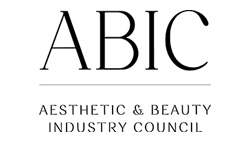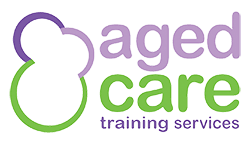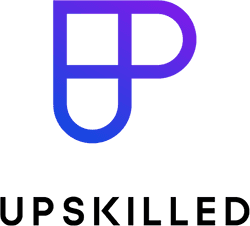In this post
Hairdressing Apprenticeship Guide: Everything you Need to Know

Becoming a hairdresser in Australia is a great career choice. If you’ve got an eye for detail, you’re outgoing and friendly, and you love to work with your hands, you’ll definitely thrive as a hairdresser.
The road to becoming a hairdresser in Australia is a little bit complicated, but this guide takes you through the entire process. It will give you insights on:
- How to become a hairdresser in Australia
- How to get a hairdressing apprenticeship
- Hairdressing apprenticeship information
This guide also explores the hairdressing industry and offers insights into where your career can take you.
You can be any age to start an apprenticeship and there are plenty of mature age apprentices out there.
Hairdressing is a large, steady business in Australia that’s currently employing over 59,100 people. The majority of these workers are female (85%) in the 25-34 age bracket.
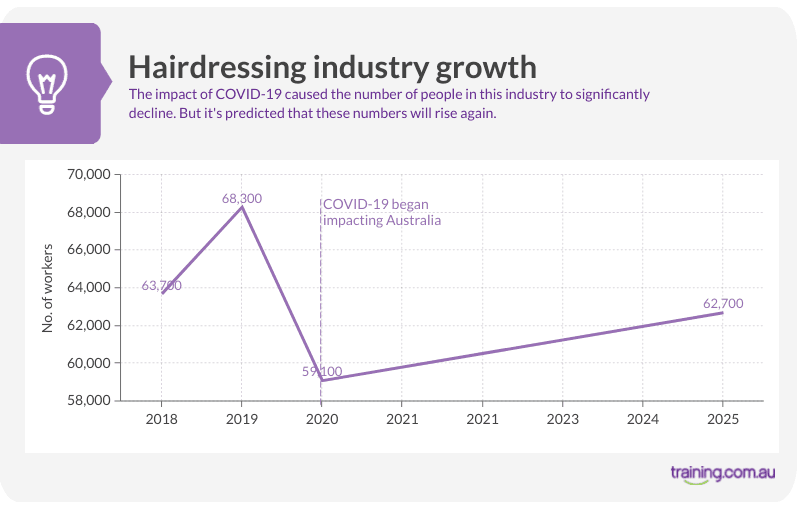
Hairdressing also offers both full-time and part-time work opportunities. Just under 50% of current hairdressing professionals work part-time hours, allowing plenty of time for other life commitments while still building a career!
How to become a hairdresser in Australia
Find a salon to employ you as an apprentice.
This will likely be the biggest hurdle to becoming a hairdresser, but you’ll be able to find an employer with a little persistence. If there’s a salon you’re passionate about working in, approach them directly and explain why you’d like to work there and what you can offer them — think of it as an on-the-spot job interview.
If you’re not fussy about which salon you complete your apprenticeship at, you can ask enrol in a course first and ask the RTO you’re studying with to source a salon to employ you.
Enrol in your chosen hairdressing qualification.
This is commonly a Certificate III in Hairdressing (SHB30416), and it must be completed with an RTO. The salon you work for may specify their preferred RTO. A hairdressing apprenticeship can take three to four years to complete.
Alternatively, you could complete the Cert III in Hairdressing alone, which will take one year of full-time study. But this may not be the best way to study, as you won’t gain the practical experience that salons are looking for in junior stylists.
Get a job as a junior stylist and progress your career.
Once you’ve completed your apprenticeship or Cert III, you’ll be a fully qualified hairdresser. You’ll be able to get a job in the industry with the title, “Junior Stylist” (pretty schmick). And from there, you’ll continue to gain mentorship from senior stylists and work your way up.
What qualifications do you need to be a hairdresser?
A hairdresser’s education is important because it creates a foundation for the practical and theoretical skills they’ll use for the rest of their career.
To become a fully qualified hairdresser, you must complete a hairdressing apprenticeship or at least hold a Cert III in Hairdressing. The good news is that there are minimal requirements for beginning your apprenticeship. You only have to be over 16 and have a minimum completion of Year 10 Literacy. If you don’t have this Year 10 Literacy pre-requisite, you can apply to study a VCAL Hair and Beauty course alongside your Year 10 studies at school. The Certificate II in Salon Assistance (SHB20216) is a great option for you!
A hairdressing apprenticeship allows you to study the technical aspects of hairdressing and give you hands-on work experience to put those skills into practice in a professional environment.
To get your first hairdressing apprenticeship, you’ll need to find a salon that will take you on as an apprentice. You’ll need to enrol in a Certificate III in Hairdressing (SHB30416) with an RTO, and the salon may specify their preferred RTO.
When it comes to studying hairdressing, there are a variety of qualifications available. They all stack together to offer a well-rounded learning experience.
This is the order hairdressing qualifications stack together in Australia:
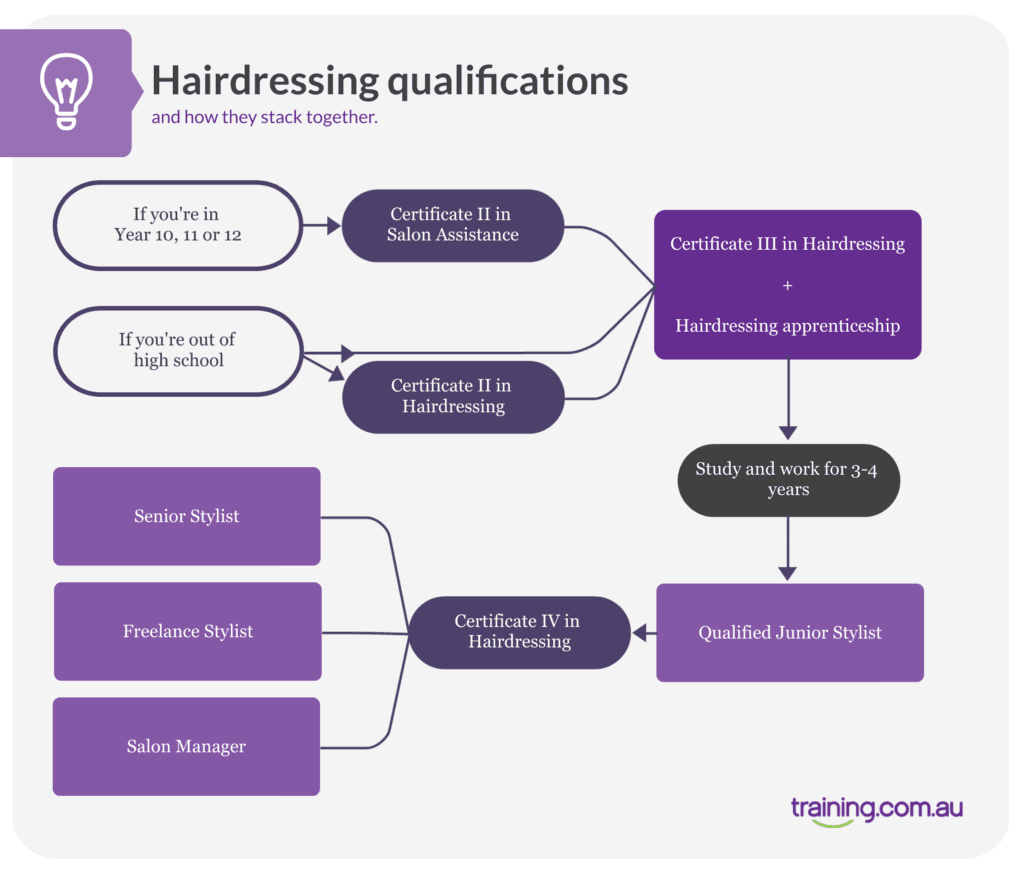
Certificate II in Hairdressing (SIH20111)
Will allow you to work as a salon assistant on a hairdressing team.
This qualification is an introduction to working as a hairdresser and the industry in general. This qualification will teach you:
- Basic hairdressing and styling techniques
- How to communicate and work effectively as part of a hairdressing team
- How to interact with clients (e.g.: consulting and booking appointments)
- How to assist other hairstylists
While you won’t be able to work independently with a Certificate II, it’s a great way to get started in the industry before you undertake further training. It will give you a solid foundation of skills to help you complete a hairdressing apprenticeship.
This qualification is optional, but will also increase your chances of getting hired as an apprentice at a salon.
Certificate III in Hairdressing (SHB30416)
Will allow you to work as a fully qualified hairdresser in a salon.
This qualification gives you all the skills and knowledge you need to succeed as a hairdresser. The techniques you’ll learn are industry relevant and up to date.
A Certificate III in Hairdressing will teach you how to:
- Cut and style hair
- Colour hair (like applying permanent and semi-permanent colour and highlights)
- Apply chemical treatments to hair
- Give client consultations
- Apply the hair and scalp treatments
You’ll also learn the science of hair, how to use salon tools and how to work safely in a salon. Once you’ve completed the Cert III you’ll be a fully qualified hairdresser, and you’ll start out as a junior stylist.
This course can be taken with an apprenticeship over three to four years. Without an apprenticeship, the course can be completed over one year.
For a salon to employ you as a hairdresser, you’ll be required to hold a Certificate III or have completed a hairdressing apprenticeship.
Certificate IV in Hairdressing (SHB40216)
Will allow you to run your own salon, become a salon manager or work as a freelance hairdresser.
This qualification can be completed after any of the preceding qualifications to build on your existing skills. Work experience as a hairdresser is a prerequisite for this course, as It will teach you complex, highly technical skills. These new skills will allow you to work as a senior or freelance hairdresser, or coordinate operations of a salon.
It’s also an important qualification to have if you want to specialise in a niche within hairdressing.
You’ll be able to work self-directed (making your own stylistic decisions for clients) and will likely support and train more junior hairdressers.
Over
78%
OF HAIRDRESSERS COMPLETE THEIR APPRENTICESHIP VIA A CERTIFICATE III OR IV IN HAIRDRESSING
If you’re unsure about hairdressing, but you’re interested in the beauty industry, there are also more general beauty courses such as a Diploma in Beauty Therapy or a Certificate IV in Beauty Therapy, which includes learning about massage, facials, waxing and more.
What’s involved in a first-year hairdressing apprenticeship?
In a first-year hairdressing apprenticeship, you’ll get to dive into the professional environment of hairdressing and have your learning guided by the professionals running your course and the hairdressers working in your salon.
While studying hairdressing, you’ll work through a variety of modules that will impart relevant skills. Your studies will likely be a mix of technical knowledge and practical skills.
During the practical aspects of your apprenticeship, you will be learning and refining your hairdressing skills.
First-year hairdressing apprentices generally assist with the upkeep of the salon, deal with clients (normally at reception), carry out some basic hairdressing services and assist colleagues. Be prepared to spend most of your time on your feet, moving around the salon. And it’s important to ensure you can be flexible and adapt to whatever schedule your salon wants you to work.
As you learn more and complete assessments, you’ll get to expand your duties within the salon.
Assessments during an apprenticeship include hands-on work (such as workplace tasks), written assignments, tests and team projects.
Hairdressing in Australia — an overview of the job
Hairdressing is a skill needed in multiple industries, including retail, health and social care and education. However, most hairdressers find themselves working within the beauty industry either in salons or as mobile hairdressers.
Some of the hard skills involved within hairdressing include:
- Shampooing and conditioning hair and scalps
- Cutting hair with relevant instruments
- Styling hair – temporary and permanent (special occasions looks, dread-locking, and perms)
- Colouring, toning and highlighting hair
- Cleaning the work area and instruments
- General hair care and health appraisals
- Computer and booking management skills
- Payment handling
However, hairdressing is not just about hard skills. ‘Soft skills’ or interpersonal skills are incredibly essential as a hairdresser. We’ve all been to the salon before and accidentally spilled our guts out to our hairdresser.
And they seem like great listeners, right? So, you can imagine their people skills have to be pretty impressive. Hairdressing is a social job and requires excellent customer service skills.
Some of the soft skills involved in hairdressing include:
- Be able to actively listen to your client and understand what they want/need
- Offer your professional advice or opinion about the clients’ hair
- Take on and handle criticism from clients and management
- Manage your time efficiently
- Being able to read a customer’s body language and facial expressions to ensure all needs are being met
Like carpentry, hairdressing is also an apprenticeship. Hairdressing is more than just grabbing a pair of scissors and hoping for the best. It involves precise motor skills, in-depth industry knowledge, organisation and fantastic customer service skills. That’s why completing a hairdressing apprenticeship is essential to begin your hairdressing career.
Career options for hairdressers
What many people don’t realise is that there are multiple career opportunities within hairdressing! There are numerous roles available to you after completing your apprenticeship and gaining more experience in the industry – it’s just up to you what part of hairdressing you enjoy the most!
Some careers are:
Salon owner/manager
Owning and managing your own salon includes not only being a professional at your craft but also being able to run a business. This includes administrative work, as well as client and employee supervision.
Product consultant
Whether you work for a specific client or salon, this role is all about those beautiful hair products we love when we go to the hairdressers. This job includes understanding industry products, quality checking, product demonstrations, and ensuring all staff understand the product and its use.
Colouring specialist
We’ve all experienced or heard of a bad die-job. As a colouring specialist, it’s up to you to ensure you never give someone a bad colouring experience, as well as fixing other technicians’ mistakes. You’ll be a master at all things dies, pigments and toners.
Salon assistant
Not all salons have a specific administrative role, but if they do, the salon assistant is usually responsible for this role. This role includes helping hairdressers with their duties while ensuring all bookings are running smoothly and payment is taken.
By completing a hairdressing apprenticeship, you’re given a hands-on approach to learning the required skills for one of the most steady, reliable businesses in Australia. Within a year, you could be a newly qualified hairdresser with multiple career pathways at your fingertips. If you’re a social, practical, hands-on person, this is the career for you!
Browse Results
Diploma of Counselling Practice CHC51015
Gain a solid theoretical foundation to start your journey into counselling practice or further study. The Institute’s Diploma of Counselling Practice introduces you to general counselling theories, ethical and legal practice, personal and professional...
Certificate IV in Human Resource Management BSB40420
This nationally recognised course will equip you with a range of functional, technical and cognitive skills required for success in the human resources sector. If you enjoy working with other people and helping both employees and companies succeed, the...
Certificate IV in School Based Education Support (VIC ONLY) CHC40221
The qualification CHC40221 – Certificate IV in School Based Education Support is referred to in industry as the Cert 4 Education Support or your teacher’s aide course. Education support workers assist teachers and support student learning in a range of...
Diploma of Community Services (Perth Only) CHC52021
The Diploma of Community Services qualification reflects the roles of community services, case management and social housing workers involved in the managing, co-ordinating and/or delivering of person-centred services to individuals, groups and communi...
Certificate III in Allied Health Assistance (Perth Only) HLT33021
Are you interested in entering the health services industry? This nationally recognised qualification will allow you to enter into one of the most rewarding and enjoyable careers! When studying this course, you will gain knowledge in a range of fields...
Canine Care and Training Certificate
Have you always dreamed of working with dogs? Are you excited to learn how to provide the best life possible for our four-legged friends? Then our Canine Care and Training Course is a perfect choice for you. To work with dogs requires a thorough unders...
Certificate in Eyebrow Facial Waxing and Tinting
Australian Beauty School’s Eyebrow, Facial Waxing & Tinting Certificate offers you the theoretical and practical knowledge to flawlessly re-shape and define stunning eyebrows. Our course covers the safe application of flawless wax, tweezing a...
Professional Make Up Artistry Certificate
Our Professional Makeup Artist Certification will teach you the key theoretical and practical skills to work as a make up artist for all occasions, including formal occasions, bridal make up, cut crease, smokey eye or even on set for the fashion and en...
Nail Tech Certificate
Our most fabulous course yet! The Nail Tech Course covers all popular nail styling methods on the market and has been developed by industry professionals to deliver the latest techniques and trends. As part of this certificate, you will learn all about...
Certificate III in Individual Support (Disability) (VIC Only, excl. Metro) CHC33021
Certificate III in Individual Support (CHC33021) qualification reflects the role of workers in the community and/or residential setting who follow an individualised plan to provide person-centred support to people who may require support due to ageing,...
Certificate IV in Accounting and Bookkeeping FNS40222
Monarch Institute is one of very few registered training organisations (RTOs) to offer the TPB (Tax Practitioners Board) approved courses required to become a registered BAS agent or a registered tax agent. We’re also included in a very select few accr...
Certificate IV in Accounting and Bookkeeping FNS40222
Become a financial all-rounder with the FNS40222 Certificate IV in Accounting and Bookkeeping. You will gain skills across the board from accounting to financial planning, bookkeeping, auditing and payroll. Whether you’re looking to start your own busi...
Certificate III in Business (Customer Engagement) BSB30120
Our nationally recognised BSB30120 Certificate III in Business (Customer Engagement) is designed to arm you with the tools to keep the customers coming back. You will learn how to use industry essential skills like producing documents, working as part...
Certificate III in Individual Support (Ageing and Disability) (WA Only) CHC33021
Our nationally recognised CHC33021 Certificate III in Individual Support (Ageing and Disability) is the perfect qualification for people who have a passion for supporting the elderly, or those with a disability, to reach their full potential. Start a c...
Certificate IV in Plumbing and Services (VIC ONLY) CPC40920
THIS COURSE IS AVAILABLE TO STUDENTS IN VICTORIA ONLY This course covers common skills relevant for the plumbing industry in addition to specialist streams relevant to drainage, gas fitting, roof drainage, sewerage and more. These plumbing training cou...
Certificate IV in Building and Construction (Building) (VIC Only) CPC40120
If you are an aspiring or working tradesperson, our building and construction certificates are your foundation for success. This is your first step towards starting your own building business and preparing for the builders registration. We understand t...
Diploma of Building and Construction (Building) (VIC Only) CPC50220
Tackle bigger and more rewarding challenges with our CPC50210 Diploma of Building and Construction (Building). If you feel you’re ready to tackle bigger and more rewarding challenges and start your own building business, then our Diploma building cours...
Certificate IV in Information Technology – Focus on Cyber Security ICT40120
The ICT40120 – Certificate IV in Information Technology – Focus on Cyber Security is a Nationally Recognised qualification designed to give you the technical skills and knowledge needed to build and advance your career in cyber security. Yo...
Diploma of Early Childhood Education and Care (Melbourne Only) CHC50121
Are you passionate about offering children the best opportunities for their individual development? Our CHC50121 – Diploma in Early Childhood Education and Care course is designed to train students in all aspects of childcare, from providing for care t...
Certificate III in Early Childhood Education and Care (Melbourne Only) CHC30121
Are you patient, flexible and wanting to help nurture our future generation? Our CHC30121 Certificate III in Early Childhood Education and Care is a course designed for entry-level into the early childhood education and care industry. As a childcare wo...
Online courses also available
Latest Articles
Agriculture Careers: What You Should Know in 2025
As one of Australia's most important industries, the agriculture industry offers great career opport...
Are Digital Skills the Key to Job Security in 2025?
The digital revolution is here, and it doesn’t care if you have a technical job or not — it’s coming...
How to Become a Chef in Australia: Complete Guide for 2025
The complete guide to becoming a chef in Australia. Learn how to get your start and make it in the h...
Want to read more?
Science Careers: How You Can Be a Part of the Future Without a PhD
There's a lot more to science careers than PhD's, so don't let this stop you pursuing a STEM career...
5 Counselling Skills You Might Already Have
If you’re thinking of becoming a counsellor, you may already have some of the key skills. Find out w...
8 Best Working From Home Jobs in 2025: How to Make Money From Home Online
Whether you’re a stay at home mum looking to earn money working from home, or looking to avoid peak...







